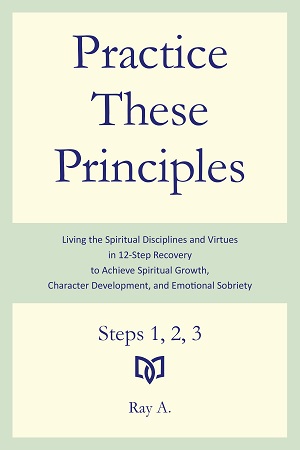
"Acknowledging and accepting our dependence on God is to Step 3 what admitting and accepting powerlessness is to Step 1. The two are closely linked. We are powerless because we are dependent. The power we need to live originates in a source beyond ourselves. If our humble admission of powerlessness is forced on us by circumstance in Step 1, in Step 3 humility is a deliberate choice and thus a true virtue. Our admission of dependence and our decision to surrender are freely made.
As with personal powerlessness, our instincts are naturally resistant to the idea of dependence. This is not surprising. It is a symptom of our spiritual illness. We can’t very well take center stage and take charge if we admit to any dependence. Blinded by pride, we claim a status of autonomy for the self that it can’t have. Indeed, personal autonomy has become for many of us the highest good, enshrined in an unabashedly self-serving conception of choice. We claim a false intellectual and above all moral independence, with self the sole arbiter of right and wrong.
And so we are willing to depend on AA when it comes to our problem with alcohol, but that is as far as we will go. As concerns the rest of our lives, we will decide for ourselves. Independence is of course another word for power. Our admission of powerlessness over alcohol in Step 1 remains that, an admission of powerlessness over alcohol. In Step 2 we still cling to intellectual self-sufficiency, coming to believe in a power greater than ourselves, but certainly no greater than a “group of drunks,” or whatever power we can “plug” into at will, on our own terms and for our own ends. Any “god” will do, so long as we pull the strings.
Before we came to AA, we had plenty of experience practicing intellectual and moral independence. And if we are honest with ourselves, where did that lead us if not to the bottle? And did we not then lose any ability to choose? Were we not then left at the mercy of our addictions? At the end of the road the fiction of personal independence led to the reality of our dependence on alcohol. As booze rendered our lives more and more unmanageable, our dependence spread to other areas. We became increasingly, sometimes even pathologically, dependent on others. How many times did we not have to rely on others to bail us out and rescue us from ourselves?
We experienced many such forms of wrong or faulty dependence, says the 12&12 as it acknowledges why “the word ‘dependence’ is as distasteful to many psychiatrists and psychologists as it is to alcoholics.”19 But what AA claims is that wrong dependence, by which is meant essentially emotional dependence, is the result of a lack of right dependence, by which is meant essentially spiritual dependence, right reliance on God.
Leave out the spiritual and “dependence” has no other reference point but, at best, weakness, at worst, neurosis and pathology. But AA sees it differently. In the spiritual life, it says, a predisposition to self-reliance and self-sufficiency leads inexorably to pride and pride to ordering my affairs not in accordance with an objective moral order, but in accordance with the imperative to serve myself.
In our striving for a false, because self-seeking, autonomy, we end up becoming dependent on the very things we hope will make us independent. We think independence will make us free. What happens in reality is that we become subject to our instincts, feelings, disordered emotions and desires, our obsessions and compulsions and impulses. Being thus at the mercy of our drives and passions, we become dependent on those things which the world tells us, and we readily believe, will satisfy them. But, as many of us discover, these forces in us can never be satisfied. We always want more, and so dependence becomes dependency becomes addiction.
The truth is that there are very few areas, if any, in which we can achieve any sort of independence, and even then not for very long. A wave will sooner or later roll in and sweep away any castle we build upon the sand.
We came into this world as dependent beings and we will leave the same. In between the first cry and the last sigh, we get to choose between two forms of dependence. If we don’t choose God, we choose self. And if we choose self, our choices will always be determined by people, places and things, even when ostensibly we are doing the choosing. This remains the case even when, in a final and futile assertion of pride, we indulge in the ultimate act of selfishness and opt to end our alcoholic lives by our own hand.
The spiritual life is full of paradox. We saw in Step 1 that strength comes out of our admission of weakness and that by accepting powerlessness over alcohol we became the recipients of a power that removed our obsession to drink. So it is with Step 3. The 12&12 says of the AAs who were first tested in WWII that “their dependence upon a Higher Power worked. And far from being a weakness, this dependence was their chief source of strength.”20
Out of right dependence on God comes true independence from the forces in ourselves and in the world that would otherwise hold us in bondage. In freely choosing to turn our will and our lives over to the care of God, we begin to regain the freedom we had long lost."
– From “Right Dependence, True Freedom,” pp. 164–166
For more PTP123 Excerpts, please click on link.